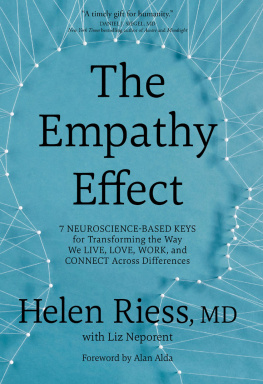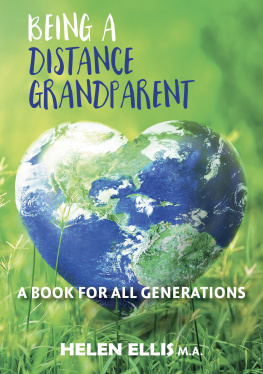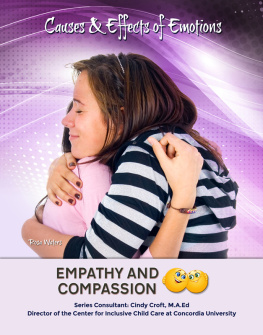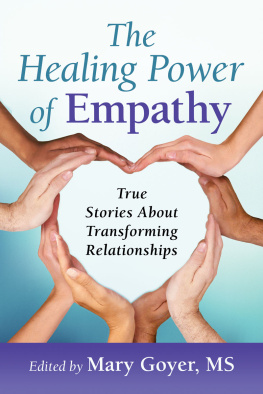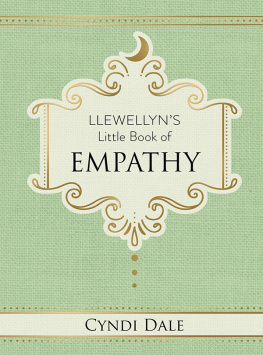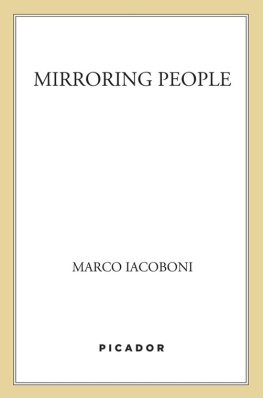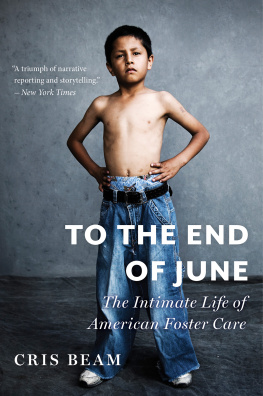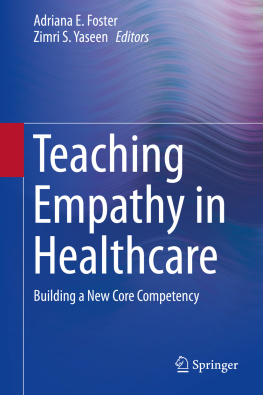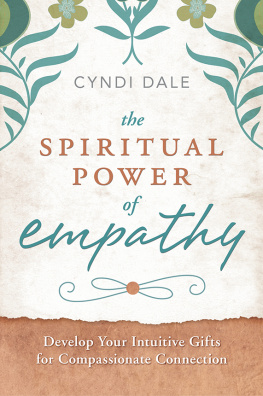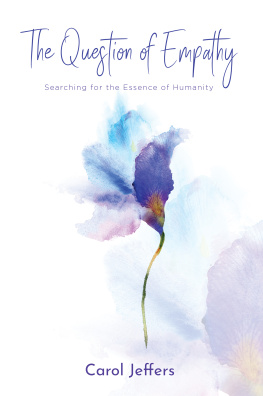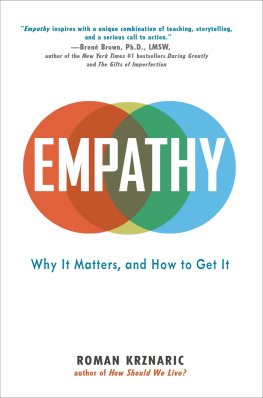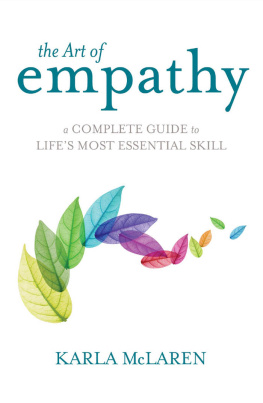Acknowledgments
T his book would not have been possible without the warm and wonderful partnership with Liz Neporent. Liz helped bring to life decades of clinical and research experience in psychiatry, neuroscience, education, and empathy by synthesizing the stories behind them in a way that would engage you, the reader. We owe deep gratitude to Linda Konnor, of Konnor Literary Agency, for providing steady support, and to our sharp-eyed editor, Caroline Pincus, whose dedication and guidance were invaluable. Liz and I are deeply grateful to our familiesNorm, Grant, and Claire Nishioka, and Jay and Skyler Shafranfor their curiosity, novel ideas, patience, and enthusiastic support.
My gratitude belongs to the psychiatry department at Massachusetts General Hospital (MGH) and Harvard Medical School, where the leadership of Drs. Ned Cassem, Jerry Rosenbaum, and Michael Jenike shaped my development as a psychiatrist, educator, and researcher. I am grateful for their support in founding the Empathy and Relational Science Program at MGH, the first hospital program of its kind.
Heartfelt thanks to my talented and dedicated colleagues and fellow researchers who have worked tirelessly on our many research projects in the MGH empathy program. Our work would not have been possible without the contributions of John Kelley, Gordon Kraft-Todd, Diego Reinero, Margot Phillips, ine Lori, Lidia Schapira, Rob Bailey, Lee Dunn, Tess Lauricella, Arabella Simpkin, Andrea Haberlein, and Joan Camprodan. Thanks also to the memory of our beloved colleague Lee Baer.
Thank you to my steadfast mentors and friends at Massachusetts General Hospital and Harvard Medical School, doctors Irene Briggin, Elizabeth Armstrong, Jon Borus, Michael Jenike, Elizabeth Mort, Maurizio Fava, Greg Friccione, John Herman, Christopher Gordon, Gene Beresin, Jim Groves, Margaret Cramer, Charlie Hatem, Carl Marci, Vicky Jackson, Juliet Jacobsen, Susan Edgman-Levitan, Tony Weiner, Beth Lown, David Eisenberg, Ed Hundert, Ron Arky, Rob Abernethy, Sherry Haydock, and Liz Gaufberg.
Im grateful to the foundations that supported our research, especially the visionary Sandra Gold and the late Arnold Gold and Richard Levin of the Arnold P. Gold Foundation for Humanism in Medicine, The Josiah Macy Jr. Foundation for Medical Education, the Risk Management Foundation, and the David Judah Fund.
I continue to be inspired by the pioneers in the field of communication and mindfulness: Alan Alda, Don Berwick, Richard Chasin, Richard Davidson, Jean Decety, Paul Ekman, the late John ODonohue, Ron Epstein, Dan Goleman, Dan Siegel, Baroness Sheila Hollins, Frank Sesno, and Tania Singer.
Special thanks to everyone who was interviewed and consulted for this book: Alan Alda, Caroline Abernethy, Frannie Abernethy Armstrong, Axelle Bagot, Susan Boisvert, Emile Boisvert, Richard Boyatzis, Christopher Gordon, Adi Haramati, Eric Kandel, Suzanne Koven, Lynn Margherio, Diane Paulus, Doug Rauch, Frank Sesno, Vicky Shen, Patty McLaughlin Simon, Dick Simon, and Renee Peterson Trudeau.
Im grateful to all my colleagues and friends in the Consortium for Research on Emotional Intelligence in Organizations including cofounders Daniel Goleman and Richard Boyatzis, and Rick Aberman, Lauris Woolford, and Doug Lennick.
Above all Im deeply grateful to all of the patients and families Ive had the privilege to work with over the years. The power that is released in those who have the courage to know their own stories, to grieve and accept what didnt go right in their lives, and then emerge whole and emboldened to embrace life, has given strength and meaning to my life. The resilience of the human spirit never ceases to inspire me as youve changed your lives for the better and made the world a more peaceful and connected place.
Heartfelt thanks to my dear friends and colleagues who read portions of the manuscript and offered their invaluable insights. Thank you to Malcolm Astley, Leigh Divine, David Frankel, Melissa Kraft, Claire Nishioka, Grant Nishioka, Nancy Rappaport, Johanna Riess Thoeresz, and Christa T. Stout.
To all the people who made Empathetics, Inc. possible, Im deeply grateful. Special thanks to Charlie MacCormack, former CEO of Save the Children and Middlebury Colleges Scholar in Residence, for his vision to spread empathy within and beyond health care. Deep gratitude to our board of directorsJoe Mondato, Pete McNerney, and Nathaniel Oppermanour advisory board, to Vance Opperman and the late Dr. Glen Nelson for their invaluable wisdom, guidance, and trust in Empathetics potential, and to all of our dedicated leaders and staff, especially Diane Blake.
Thank you to my friends whose support was invaluable as I wrote this book: Melissa Kraft, Nan Stout, Wendy Gordon, Larry Rowe, Nancy Persson, Ruthann Harnisch, Eve Ekman, Sandy Honeyman, Frank Sesno, John Weinberg, Cathy Lee, Malcolm Astley, Pam Swing, Diane and Dean Goodermote, and Kim and Ernie Parizeau. Thank you to all the special women of Wayland who help balance my life and our kayak group: Jill Dalby Ellison, Anne Gilson, Annie Hollingsworth, Barb Burgess, Barb Fletcher, Bredt Handy Reynolds, Kim Wilson, Megan Lucier, and Nancy Osborn.
Sincere thanks to my parents, my brother, Victor, and to Jinny and Peter Bossart, for inspiring my love of classical music, art, photography, medicine, and faith that led to this book. Thanks to the amazing Nishioka family and especially my mother-in-law, Shizuye Nishioka, who exemplifies the principle that grace and dignity can prevail in spite of the most adverse circumstances. And special thanks to Adele Bargel, for living a life infused with empathy and who taught me about its power since early childhood.
Thanks to all who are not mentioned here but who have been an important part of this journey.
No one deserves more thanks than my sister, Johanna Riess Thoeresz, who has been my inspiration, role model, and best friend. Thank you.
About the Author
H elen Riess, MD, is a practicing psychiatrist, associate clinical professor of psychiatry at Harvard Medical School, and director of the Empathy and Relational Science Program at Massachusetts General Hospital (MGH). She is a core member of the Consortium for Research on Emotional Intelligence in Organizations. Dr. Riess developed an empathy training approach based on research in the neurobiology and physiology of empathy that has been rigorously tested in pilot studies and a randomized, controlled trial at MGH. She completed her residency and chief residency at MGH and Harvard Medical School. Dr. Riess has devoted her career to teaching and research in the art and science of the patient-doctor relationship. She is an internationally recognized educator, researcher, and speaker whose landmark article, Empathy in MedicineA Neurobiological Perspective, published in the Journal of the American Medical Association in 2010, transformed how physicians view empathy. Dr. Riess cofounded and serves as chief scientific officer of Empathetics, Inc., a platform that has trained thousands of medical professionals, educators, and leaders in empathic communication. She has received numerous awards for her groundbreaking research. Riess received her MD from Boston University School of Medicine and her BA from Wesleyan University.
Shared Mind Intelligence
S andra dropped into the chair in my office with a heavy sigh. The expression on her face was foreboding.
I dont know how Im ever going to get over what happened, she said.
I felt my throat tighten and my heartbeat quicken. Without knowing the details, I had caught her emotion as a sense of dread and fear spread through me. She had been a first responder at the Boston Marathon bombing. While she was trying to remove the shoe from an injured runners leg, his entire leg came off in her hands.
Perhaps this story made you gasp or left you feeling uncomfortable. Maybe you reached unconsciously for your own leg. If so, you are having a shared mind experience.
Next page
